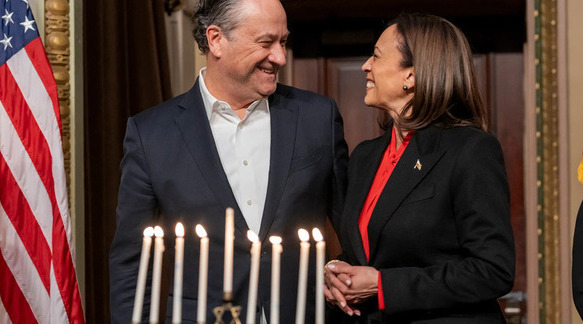Binyamin Zomer of Noble Energy tells his company's side of Israel's natural gas controversy.

Raised by an Israeli father and American mother in Tulsa, Oklahoma, Bini Zomer calls himself the only person ever to move from Oklahoma to Israel to work in the oil and gas industry. After almost five years as Noble Energy’s Director of Corporate Affairs in Israel, Zomer was appointed Israel Country Manager of Noble Energy in October, 2014, just a few months before David Gilo reneged on the consent decree with Noble and Delek that would have solved the anti-trust issues.
Let’s start from the beginning. Tell us about Noble Energy, how the company got to Israel, and the timeline of gas discoveries.
Noble Energy was founded by Lloyd Noble in 1932 in Ardmore, Oklahoma. Like many Oklahoman oil companies, at some point it moved to Houston. The company is publicly traded (NYSE: NBL) but is not one of the major, integrated oil companies. We’re both onshore and offshore, split pretty evenly between oil and gas and again pretty evenly between the US and international.
We’ve been in Israel since 1998. That’s seventeen years that included some major governmental change, an intifada, and several wars. We didn’t just show up here yesterday. When we came, nothing was proven. There had been no significant oil and gas discoveries.
In 1999 we made a very small discovery – the Noa field. In 2000 we discovered the Mari B or Yam Tethys field about 30km off the coast of Ashkelon. The field held about 28 bcm (billion cubic meters) of natural gas. That was the discovery that essentially created the natural gas market in Israel.
After the discovery, there was a sense of optimism that Israel would find more oil and gas and that it would behoove the government to investigate the possibility of changing its tax and royalty structure for gas production. They closed the sea – that is, they stopped issuing exploration and production licenses – but existing license holders were told that they could keep drilling and that they would be grandfathered in under the old structure. After seven years, with no new discoveries and no new investors, the government decided that there was no justification for changing the tax structure, and the Minister of Energy announced the reopening of the sea for exploration licenses in 2007.
This is an important part of the story. The claim that the government just never thought about its fiscal structure for the oil and gas industry until the big discoveries were made is not true. The Energy Minister’s announcement made it clear that the government thought about it and decided that in order to attract investment and exploration, the government take would be low. Nobody wanted to enter the Israeli market in 2007-2008. British Gas couldn’t find a buyer for its Tamar license. The presumption in Israel then was that the gas from Yam Tethys would run out and the Egyptians would have a monopoly on the Israeli gas market. Israeli officials were even looking at the possibility of importing from Russia and elsewhere.
Then, in 2009 we made the Tamar discovery (Delek, which had acquired the license from British Gas, brought us in as the operator), and in 2010, we made the Leviathan discovery (in an area licensed to Ratio, which brought us on as the operator because they did not have nearly enough resources or expertise to develop the site. They were also unable to locate any other company that was willing to come to Israel).
Not long after our discoveries, the government appointed the Sheshinski Commission to investigate changing the tax regime and applying it retroactively to our existing discoveries.
In this timeline, you didn’t mention Yossi Langotsky. What was his role in the development of Israel’s gas industry?
First of all, I have never met him, so everything I know is second hand. My understanding is that he is a geologist. To my knowledge, his greatest success was as an advocate of Israel. He brought British Gas to Israel—no mean feat, as BG is a major global company. BG’s experts showed the existence of the Tamar structure, but they were unwilling to drill an exploration well, and they left. So yes, he did some good things for Israel’s oil and gas industry, but he is not its “father” and he did not discover the gas.
The one thing I often hear him say is that “Noble and Delek got Tamar on a ‘Golden Platter.’” Nothing could be further from the truth. Remember, BG did not believe that it was worth drilling. They thought the reservoir pressure was too high and that the quantity of gas was much less. Furthermore, at the existing gas price in Israel, they didn’t think it was worth the risk. When we drilled the exploration well in Tamar at a cost of more than $100 million, there was only a 35 percent chance of success.

An unstable regulatory environment
What was the original structure of Israel’s tax regime, and what changed?
In its 1952 Petroleum Law, Israel adopted what’s called a concessionary system. This is the system used by the US, the UK, Australia, and other countries. In this system, investors have a greater amount of freedom but also assume a bigger risk.
The principle of the concessionary license system is that the state transfers its ownership of resources in the subsoil to a commercial entity, often a partnership of companies. The companies obtains exclusive rights to extract crude oil and natural gas in a defined area for a limited time. One of the companies is often assigned the operator role, which carries out the actual work on behalf of the group. That is the role Noble plays. In fact, because oil and gas expertise does not exist in Israel, it is mandatory to bring in an international operator.
Other countries, often – but not exclusively – poor, undeveloped countries, have adopted a production sharing contract mechanism. In this system, the government shares in the exploration and production costs. The state retains its ownership to hydrocarbon resources. A commercial entity—the contractor company—is engaged to extract petroleum according to some contract. The countries using this type of system often has their state-owned oil company to represent the interests of the state.
Under a concessionary system, the investor has to be able to feel comfortable that the rules are stable and that the state will not seek to alter the economic equilibrium that exists when the investments are made.
Because this isn’t a contractual system, it’s hard to say that anything was promised to us, but we presumed that Israel would function much the same way that other Western, OECD member countries function. The Minister of Energy’s announcement when they closed the sea that “grandfathered” existing license holders reinforced this presumption.
That stability was called into question with the decision Government to adopt the changes recommended by the Sheshinski Commission on existing discoveries and on projects where significant investments were already made.
There’s this notion that corporations are anti-regulation. We’re not. Unregulated environments are the hardest to operate in. We want regulation, but we want the regulations to be known, stable, and in consonance with best practices around the world. The oil and gas industry is not a new industry; it has been around for over a hundred years, but it’s new to Israel. So our recommendation to the regulators in Israel has been that they should adopt an existing regulatory regime where there is an ongoing exploration and production industry. That way, you know that the regulatory environment doesn’t stop development. If you want to adopt US regulations for the Gulf of Mexico, fine. If not, then go to Norway, or Australia. There’s no need to reinvent the wheel.
Do you think Israel will arrive at a sane and stable policy?
The crisis created by the antitrust commissioner has focused the government on the need to create balance. The populist debate focuses only on competition and pricing. But the new framework balances a number of government interests: developing the fields to create redundancy and energy security—right now all of Israel’s gas comes through one pipe to one facility. You also want to encourage other companies to come and invest, and you also want to make sure Israelis pay a fair price. The current framework does all of that. The clarity and stability that Noble seeks is a requirement for any company weighing entering the Israeli market. If it exists I believe they will come because there is much more potential in the basin.
According to the US Geological Survey estimate, we’ve only discovered one-third, maybe a bit more, of the gas in Israel’s exclusive economic zone. But nobody’s going to come unless the regulatory environment is one in which companies are willing to invest in.
The proof is in the pudding right now. Don’t take our word for it that this is a broken regulatory environment. Look around. There’s nobody else here. Silvan Shalom told Shelly Yechimovich in the Knesset when she said there are companies that would come and invest: “You’re living in a dream world. There’s nobody coming to invest!”
It’s a shame. When I started at Noble five years ago, I thought we would be treated better. Here’s a company that took a risk and invested in Israel when nobody else did. We made discoveries. Before we started producing from Mari B in 2004, Israel’s electricity production was a combination of 40% liquid fuel oils and 60% coal. Between 2004 and 2011, natural gas displaced all of the liquid fuels and became 40% of Israel’s electricity production. Liquid fuels cost more than three times what natural gas costs, so we provided Israel billions of shekels in cost savings. Now, under the Sheshinski agreements, 60-65% of all revenues over the life of each field go to the government.
Yet we have met obstacles every step of the way, whether from regulators or politicians or the opposition or the press. You would think that everything here was great for the Israeli consumer until we discovered gas. It’s such a distortion of the facts. There is one report by the public utilities authority that ostensibly shows that Israel pays a high price for gas. IHS – perhaps the most well-respected energy industry consulting firm in the world – demonstrated that this report chose data points that willfully distort reality. Israel does not pay a high price for gas. Yet the entire pricing discussion today is based on the distortions of that one report.
Ultimately, though, the fact that we are finally seeing some real political leadership after five years is encouraging. The only way to get this done is through real political leadership. The current framework balances the country’s needs and provides us with a path forward to develop Leviathan—which is the most important thing for us and for the country. We were willing to make concessions to get to that path forward within the context of a balanced framework.

Talking dollars and cents
What are the concessions did you made under the framework?
First, we agreed to sell down our assets in Tamar to 25% within six years. In the general course of business, companies are always evaluating their holdings in assets. Here, the government is mandating a sale but within a timeline that we believe can work. Second, there are price controls. Until there is domestic competition from Tanin and Karish, Delek is out of Tamar and Noble is at 25%, the price ceiling is the weighted average price of gas sold in Israel (today it’s $5.43). In addition, if we have an export contract for less than the weighted average price, we have to offer that price to Israeli customers. So if I have a contract to sell 9 billion cubic meters to, say BG, at $4 per cubic meter, and some Israeli bakery wants to buy 9,000 cubic meters—a millionth of the other contract—I have to offer the same price.
Look, Israel wanting to make sure that the price here is not higher than the price abroad makes sense. “Export Parity” is contemplated in the Petroleum Law. The question is whether the mechanism for arriving at export parity hamstrings those export contracts, which are key to development of the fields. The domestic market is simply not big enough to drive that development. The current framework works, but as a package. Changing one aspect or pushing for more concessions on one variable can upset the balance of the entire framework.
Is the current instability in Israel typical? What goes one elsewhere?
Natural resources are a complex issue and it’s important to have public discussion about them. But here in Israel, everything is a cause for a protest, and the tone of the debate, the populism, does not lend itself to a discussion of the facts. The more that we deal with the facts, the more beneficial and the more efficient the decision-making will be.
Another unique aspect of the Israeli situation is the size of the discoveries relative to the size of the market. Here you have two of the largest discoveries in the world in a market a bit bigger than that of Houston. And you have regulators who didn’t even think there would be any discoveries.
So some of the issue is growing pains. Israel has not yet gotten used to thinking about these issues, so it changed the rules, which created instability. When a company is looking to invest, it looks at three variables. Each company assesses and weighs them differently, but it’s the same three variables: geology, market, and the stability of the regulatory environment. It’s important for all three to be attractive.
We’ve invested over $2.5 billion in Israel over the past 17 years. As a partnership, we’ve invested over $6 billion. Noble is cash flow negative almost a billion dollars. It’s not a sad story because we have two of the largest natural gas discoveries in the world. Developing Leviathan will cost billions more before we start seeing a return. If you can’t count on a stable regulatory environment for the time you start seeing the income, you can’t make the investment. It’s not just us; our competitors want to see a stable environment. The country wants to see a stable environment. And right now, there is zero exploration going on here.
Egypt can be a cautionary tale. In 2011, Egyptian gas stopped flowing. Two reasons are known—the fall of Mubarak and the loss of control of the Sinai. But there was a third factor: price controls on gas—exactly what some people are calling for here—that were so low that demand spiked. But there was no incentive for exploration and production companies to continue to invest if they would be forced to sell for so little. This led to a gas shortage in Egypt.
The al-Sisi regime realizes this error and has raised prices and is providing tax benefits to exploration and production companies. If you factor in those benefits, the price of gas in Egypt is closer to $7-8, much higher than Israel, where they want to cap the price. The bottom line is that where the price of gas is too low, you see no exploration and production activity.
Would you go to an international arbitration panel? Is there a point at which you cut your losses and go home?
We came to Israel to explore and produce gas. We agreed to the proposed framework to avoid the legal path—not because we are afraid of it but because we want to move forward with supplying gas to Israel and to the region. Having said that, we received our rights lawfully and from the government, and we will defend those rights with every tool at our disposal. We hope the framework will be adopted and we can move forward. We’re a company of engineers, not attorneys.
We’re not going home, though. We’re already producing from Tamar, and we have every intention of producing from Leviathan, too. It’s just a question of when the regulatory structure allows us to do it. We’ve already invested a billion dollars in Leviathan, and we’re going to be the ones to develop it.
Did Noble delay development of Leviathan in order to put pressure on the government?
We and our partners have already developed a billion dollars in Leviathan with no return whatsoever. Nobody has more of an interest in developing Leviathan as soon as possible than we do.
We reached an understanding with the antitrust commissioner in March 2014. For the next nine months, to keep to the timeline, we were investing up to $25 million per month on Leviathan. It was only in December, when he reneged on the understanding, that we stopped investing in Leviathan. We couldn’t keep investing without the regulatory certainty we would need to keep moving forward, and especially when our very ownership of the asset was being called into question. The new framework will allow us to restart our investments in moving Leviathan forward.
Finally, a populist question: How much does the price of gas affect the average Israeli?
The cost savings from switching to natural gas are huge. If you look at IEC’s financial statements from 2013 and 2014, you will see that in the year and nine months that Tamar gas flowed IEC reduced its costs by more than 20 billion shekels. If you look at all of our customers they have also saved money. In fact, certain factories are operating today thanks to the low price of natural gas.
Having said that, those savings happened because natural gas displaced much higher priced oil. The discussion today of reducing prices from today’s average by $0.40 won’t have much of an impact at all. In fact, if the cost of gas would be cut in half, you wouldn’t see more than a 5% dip in the cost of your electricity bill. But the government would lose out on a great deal of revenue, so such low prices would actually do more harm than good.
Moreover, the Bank of Israel has already said that they don’t want natural gas to be too cheap, as it would basically subsidize inefficient industries. So they have said that they’ll tax it if it becomes too cheap.
To receive updates on new articles in English, join Mida on Facebook or Twitter or join our mailing list.





